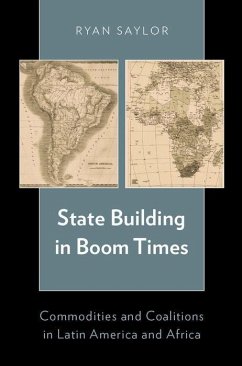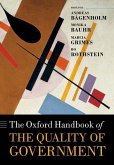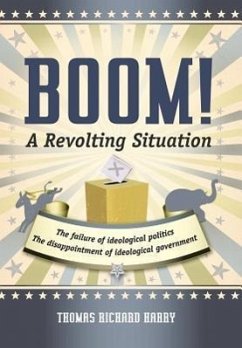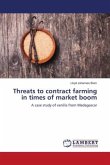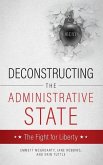- Gebundenes Buch
- Merkliste
- Auf die Merkliste
- Bewerten Bewerten
- Teilen
- Produkt teilen
- Produkterinnerung
- Produkterinnerung
State Building in Boom Times maintains that coalitional politics accounts for why resource booms yield divergent state building. Countries ruled by export-oriented coalitions expand state capacity amid commodity booms. But when exporters are politically marginalized, ruling coalitions prey upon export wealth, to the detriment of state capacity.
Andere Kunden interessierten sich auch für
![The New Entrepreneurial Advocacy The New Entrepreneurial Advocacy]() Darren R HalpinThe New Entrepreneurial Advocacy46,99 €
Darren R HalpinThe New Entrepreneurial Advocacy46,99 €![The Oxford Handbook of the Quality of Government The Oxford Handbook of the Quality of Government]() The Oxford Handbook of the Quality of Government220,99 €
The Oxford Handbook of the Quality of Government220,99 €![Politics at Work Politics at Work]() Alexander Hertel-FernandezPolitics at Work36,99 €
Alexander Hertel-FernandezPolitics at Work36,99 €![Boom! a Revolting Situation Boom! a Revolting Situation]() Thomas Richard HarryBoom! a Revolting Situation27,99 €
Thomas Richard HarryBoom! a Revolting Situation27,99 €![Threats to contract farming in times of market boom Threats to contract farming in times of market boom]() Lloyd Johannes BlumThreats to contract farming in times of market boom64,99 €
Lloyd Johannes BlumThreats to contract farming in times of market boom64,99 €![The Politics of Telecommunications The Politics of Telecommunications]() Mark ThatcherThe Politics of Telecommunications344,99 €
Mark ThatcherThe Politics of Telecommunications344,99 €![Deconstructing the Administrative State Deconstructing the Administrative State]() Emmett McGroarty Jane Robbins TuttleDeconstructing the Administrative State28,99 €
Emmett McGroarty Jane Robbins TuttleDeconstructing the Administrative State28,99 €-
-
-
State Building in Boom Times maintains that coalitional politics accounts for why resource booms yield divergent state building. Countries ruled by export-oriented coalitions expand state capacity amid commodity booms. But when exporters are politically marginalized, ruling coalitions prey upon export wealth, to the detriment of state capacity.
Produktdetails
- Produktdetails
- Verlag: Hurst & Co.
- Seitenzahl: 256
- Erscheinungstermin: 11. Juli 2014
- Englisch
- Abmessung: 237mm x 160mm x 22mm
- Gewicht: 530g
- ISBN-13: 9780199364954
- ISBN-10: 0199364958
- Artikelnr.: 40028535
- Herstellerkennzeichnung
- Libri GmbH
- Europaallee 1
- 36244 Bad Hersfeld
- gpsr@libri.de
- Verlag: Hurst & Co.
- Seitenzahl: 256
- Erscheinungstermin: 11. Juli 2014
- Englisch
- Abmessung: 237mm x 160mm x 22mm
- Gewicht: 530g
- ISBN-13: 9780199364954
- ISBN-10: 0199364958
- Artikelnr.: 40028535
- Herstellerkennzeichnung
- Libri GmbH
- Europaallee 1
- 36244 Bad Hersfeld
- gpsr@libri.de
Assistant Professor of Political Science, University of Tulsa
* Acknowledgments
* 1. The Multiple Motives behind State Building in the Developing World
* The Revenue Imperative and State Building in the Developing World
* Alternative State Building Motives
* Boom Times and State Building in Coalitional Perspective
* Commodity Booms and State Building in Latin America and Africa
* 2. Boom Times, Coalitional Politics, and State Building
* State Capacity, Public Goods, and Institutions: The Conceptual
Terrain
* A Coalitional Approach to State Building: The Theoretical Argument
* Case Selection and Measurement
* Alternative Hypotheses
* 3. Striking State Building due to Chile's Double Boom, 1848-1883
* Chile at Mid-Century
* The Revenue Imperative and Chilean State Building
* Chile's Double Boom in Wheat and Copper
* Public Goods Provided, but only to Ruling Coalition Members
* An Opposition Enriched, Civil War, and Institution Building
* Chile in 1883: A Precocious Latin American Leviathan
* 4. Seizing State Building Opportunities during Argentina's Wool Boom,
1852-1886
* Argentina at Mid-Century
* The Revenue Imperative and Argentine State Building
* Argentina's Wool Boom
* New Public Goods for Powerful Ranching Elites
* Enriching Exports, Inter-Provincial Conflict, and Institution
Building
* Argentina in 1886: From Port City to Modern State
* 5. Sugar Exporters, New Public Goods, and State Building in
Mauritius, 1825-1895
* Initial Conditions in Mauritius, 1825
* The Revenue Imperative and Mauritian State Building
* The Sugar Boom and the Transformation of Mauritius
* Public Goods Seeking and Mauritian State Building
* Without a Diametrical Threat, Mediated Institutions Remain
* Mauritius in 1895: New Public Goods and a Growth in State Capacity
* 6. Marginalized Coffee Exporters and Missed State Building
Opportunities in Colombia, 1880-1905
* Colombia in the Late Nineteenth Century
* The Revenue Imperative and Colombian State Building
* Colombia's Coffee Boom
* Ostracized Coffee Exporters Fail to Obtain New Public Goods
* A Non-Elemental Threat Obviates Institution Building
* Persistent State Weakness in Colombia
* 7. Nationalist Politicians Squander State Building Opportunities
while Fleecing Cocoa Exporters in Ghana, 1945-1966
* Ghana at Mid-Century
* The Revenue Imperative and Ghanaian State Building
* Ghana's Postwar Cocoa Boom
* The CPP Frustrates Exporters' Efforts to Obtain New Public Goods
* The Persistence of Mediated Institutions in Postwar Ghana
* Ghana in 1966: Illusory State Building and Low State Capacity
* 8. Exporters' Marginalization and the Persistence of Nigeria's Weak
State, 1945-1966
* Nigeria at Mid-Century
* The Revenue Imperative and Nigerian State Building
* The Agricultural Commodity Boom
* Politically Marginalized Exporters Fail to Obtain New Public Goods
* Institutional Decentralization to Placate Nationalist Elites
* Nigeria in 1966: An Enervated State
* 9. Conclusion and Implications
* Theoretical Implications
* What Is the Resource Curse?
* Policy Implications
* References
* 1. The Multiple Motives behind State Building in the Developing World
* The Revenue Imperative and State Building in the Developing World
* Alternative State Building Motives
* Boom Times and State Building in Coalitional Perspective
* Commodity Booms and State Building in Latin America and Africa
* 2. Boom Times, Coalitional Politics, and State Building
* State Capacity, Public Goods, and Institutions: The Conceptual
Terrain
* A Coalitional Approach to State Building: The Theoretical Argument
* Case Selection and Measurement
* Alternative Hypotheses
* 3. Striking State Building due to Chile's Double Boom, 1848-1883
* Chile at Mid-Century
* The Revenue Imperative and Chilean State Building
* Chile's Double Boom in Wheat and Copper
* Public Goods Provided, but only to Ruling Coalition Members
* An Opposition Enriched, Civil War, and Institution Building
* Chile in 1883: A Precocious Latin American Leviathan
* 4. Seizing State Building Opportunities during Argentina's Wool Boom,
1852-1886
* Argentina at Mid-Century
* The Revenue Imperative and Argentine State Building
* Argentina's Wool Boom
* New Public Goods for Powerful Ranching Elites
* Enriching Exports, Inter-Provincial Conflict, and Institution
Building
* Argentina in 1886: From Port City to Modern State
* 5. Sugar Exporters, New Public Goods, and State Building in
Mauritius, 1825-1895
* Initial Conditions in Mauritius, 1825
* The Revenue Imperative and Mauritian State Building
* The Sugar Boom and the Transformation of Mauritius
* Public Goods Seeking and Mauritian State Building
* Without a Diametrical Threat, Mediated Institutions Remain
* Mauritius in 1895: New Public Goods and a Growth in State Capacity
* 6. Marginalized Coffee Exporters and Missed State Building
Opportunities in Colombia, 1880-1905
* Colombia in the Late Nineteenth Century
* The Revenue Imperative and Colombian State Building
* Colombia's Coffee Boom
* Ostracized Coffee Exporters Fail to Obtain New Public Goods
* A Non-Elemental Threat Obviates Institution Building
* Persistent State Weakness in Colombia
* 7. Nationalist Politicians Squander State Building Opportunities
while Fleecing Cocoa Exporters in Ghana, 1945-1966
* Ghana at Mid-Century
* The Revenue Imperative and Ghanaian State Building
* Ghana's Postwar Cocoa Boom
* The CPP Frustrates Exporters' Efforts to Obtain New Public Goods
* The Persistence of Mediated Institutions in Postwar Ghana
* Ghana in 1966: Illusory State Building and Low State Capacity
* 8. Exporters' Marginalization and the Persistence of Nigeria's Weak
State, 1945-1966
* Nigeria at Mid-Century
* The Revenue Imperative and Nigerian State Building
* The Agricultural Commodity Boom
* Politically Marginalized Exporters Fail to Obtain New Public Goods
* Institutional Decentralization to Placate Nationalist Elites
* Nigeria in 1966: An Enervated State
* 9. Conclusion and Implications
* Theoretical Implications
* What Is the Resource Curse?
* Policy Implications
* References
* Acknowledgments
* 1. The Multiple Motives behind State Building in the Developing World
* The Revenue Imperative and State Building in the Developing World
* Alternative State Building Motives
* Boom Times and State Building in Coalitional Perspective
* Commodity Booms and State Building in Latin America and Africa
* 2. Boom Times, Coalitional Politics, and State Building
* State Capacity, Public Goods, and Institutions: The Conceptual
Terrain
* A Coalitional Approach to State Building: The Theoretical Argument
* Case Selection and Measurement
* Alternative Hypotheses
* 3. Striking State Building due to Chile's Double Boom, 1848-1883
* Chile at Mid-Century
* The Revenue Imperative and Chilean State Building
* Chile's Double Boom in Wheat and Copper
* Public Goods Provided, but only to Ruling Coalition Members
* An Opposition Enriched, Civil War, and Institution Building
* Chile in 1883: A Precocious Latin American Leviathan
* 4. Seizing State Building Opportunities during Argentina's Wool Boom,
1852-1886
* Argentina at Mid-Century
* The Revenue Imperative and Argentine State Building
* Argentina's Wool Boom
* New Public Goods for Powerful Ranching Elites
* Enriching Exports, Inter-Provincial Conflict, and Institution
Building
* Argentina in 1886: From Port City to Modern State
* 5. Sugar Exporters, New Public Goods, and State Building in
Mauritius, 1825-1895
* Initial Conditions in Mauritius, 1825
* The Revenue Imperative and Mauritian State Building
* The Sugar Boom and the Transformation of Mauritius
* Public Goods Seeking and Mauritian State Building
* Without a Diametrical Threat, Mediated Institutions Remain
* Mauritius in 1895: New Public Goods and a Growth in State Capacity
* 6. Marginalized Coffee Exporters and Missed State Building
Opportunities in Colombia, 1880-1905
* Colombia in the Late Nineteenth Century
* The Revenue Imperative and Colombian State Building
* Colombia's Coffee Boom
* Ostracized Coffee Exporters Fail to Obtain New Public Goods
* A Non-Elemental Threat Obviates Institution Building
* Persistent State Weakness in Colombia
* 7. Nationalist Politicians Squander State Building Opportunities
while Fleecing Cocoa Exporters in Ghana, 1945-1966
* Ghana at Mid-Century
* The Revenue Imperative and Ghanaian State Building
* Ghana's Postwar Cocoa Boom
* The CPP Frustrates Exporters' Efforts to Obtain New Public Goods
* The Persistence of Mediated Institutions in Postwar Ghana
* Ghana in 1966: Illusory State Building and Low State Capacity
* 8. Exporters' Marginalization and the Persistence of Nigeria's Weak
State, 1945-1966
* Nigeria at Mid-Century
* The Revenue Imperative and Nigerian State Building
* The Agricultural Commodity Boom
* Politically Marginalized Exporters Fail to Obtain New Public Goods
* Institutional Decentralization to Placate Nationalist Elites
* Nigeria in 1966: An Enervated State
* 9. Conclusion and Implications
* Theoretical Implications
* What Is the Resource Curse?
* Policy Implications
* References
* 1. The Multiple Motives behind State Building in the Developing World
* The Revenue Imperative and State Building in the Developing World
* Alternative State Building Motives
* Boom Times and State Building in Coalitional Perspective
* Commodity Booms and State Building in Latin America and Africa
* 2. Boom Times, Coalitional Politics, and State Building
* State Capacity, Public Goods, and Institutions: The Conceptual
Terrain
* A Coalitional Approach to State Building: The Theoretical Argument
* Case Selection and Measurement
* Alternative Hypotheses
* 3. Striking State Building due to Chile's Double Boom, 1848-1883
* Chile at Mid-Century
* The Revenue Imperative and Chilean State Building
* Chile's Double Boom in Wheat and Copper
* Public Goods Provided, but only to Ruling Coalition Members
* An Opposition Enriched, Civil War, and Institution Building
* Chile in 1883: A Precocious Latin American Leviathan
* 4. Seizing State Building Opportunities during Argentina's Wool Boom,
1852-1886
* Argentina at Mid-Century
* The Revenue Imperative and Argentine State Building
* Argentina's Wool Boom
* New Public Goods for Powerful Ranching Elites
* Enriching Exports, Inter-Provincial Conflict, and Institution
Building
* Argentina in 1886: From Port City to Modern State
* 5. Sugar Exporters, New Public Goods, and State Building in
Mauritius, 1825-1895
* Initial Conditions in Mauritius, 1825
* The Revenue Imperative and Mauritian State Building
* The Sugar Boom and the Transformation of Mauritius
* Public Goods Seeking and Mauritian State Building
* Without a Diametrical Threat, Mediated Institutions Remain
* Mauritius in 1895: New Public Goods and a Growth in State Capacity
* 6. Marginalized Coffee Exporters and Missed State Building
Opportunities in Colombia, 1880-1905
* Colombia in the Late Nineteenth Century
* The Revenue Imperative and Colombian State Building
* Colombia's Coffee Boom
* Ostracized Coffee Exporters Fail to Obtain New Public Goods
* A Non-Elemental Threat Obviates Institution Building
* Persistent State Weakness in Colombia
* 7. Nationalist Politicians Squander State Building Opportunities
while Fleecing Cocoa Exporters in Ghana, 1945-1966
* Ghana at Mid-Century
* The Revenue Imperative and Ghanaian State Building
* Ghana's Postwar Cocoa Boom
* The CPP Frustrates Exporters' Efforts to Obtain New Public Goods
* The Persistence of Mediated Institutions in Postwar Ghana
* Ghana in 1966: Illusory State Building and Low State Capacity
* 8. Exporters' Marginalization and the Persistence of Nigeria's Weak
State, 1945-1966
* Nigeria at Mid-Century
* The Revenue Imperative and Nigerian State Building
* The Agricultural Commodity Boom
* Politically Marginalized Exporters Fail to Obtain New Public Goods
* Institutional Decentralization to Placate Nationalist Elites
* Nigeria in 1966: An Enervated State
* 9. Conclusion and Implications
* Theoretical Implications
* What Is the Resource Curse?
* Policy Implications
* References

